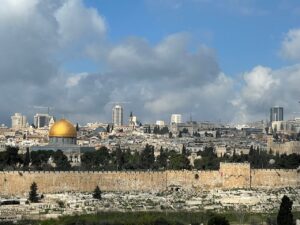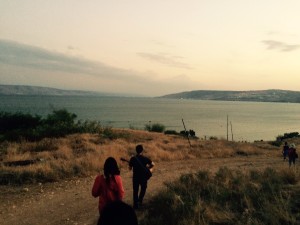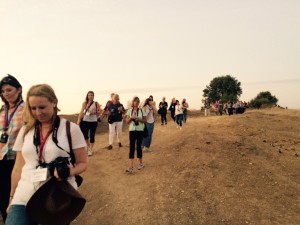As we prepare for Holy Week next month, my heart is tuned to the vignettes leading up to the most significant event in human history–the death and resurrection of our Savior Jesus Christ. Having been blessed to visit Israel five times over the last 10 years, I’ll try to boost the sensory, experiential journey of the sights, sounds, smells of Jesus’ journey to the cross and tomb. Throughout these weeks and through Holy Week, I’ll bring some of my reflections on the events of Easter.
What a week. What a Holy Week. Isn’t it amazing that the first half of the Gospel of John covers the first 33 years of Jesus’ life, and the last half covers one week?
Just six days before the Passover and Jesus’ triumphal entry into Jerusalem, Jesus was invited to attend a dinner in Bethany in His honor, hosted by Mary, Martha, and their resurrected brother Lazarus. Can you only imagine what a fun party that would be? For Jesus to have supper with Lazarus, whom Jesus raised from the dead, AND his two sisters?
“Then Mary took a pint of pure nard, an expensive perfume; she poured it on Jesus’ feet and wiped His feet with her hair. And the house was filled with the fragrance of the perfume.” John 12:3 NIV.

What a beautiful, selfless, sacrificial gift Mary gave Jesus. Of course it was disciple Judas who complained that her gift to Jesus at the party was wasteful and too expensive. Judas was the treasurer and thief-disciple who would betray Jesus in just a few days.
When we give sacrificially some people don’t understand. Like Mary, we may looked at as “over the top” or “too much.” Jesus understood Mary and her heart.
“Leave her alone,” Jesus replied. “It was intended, that she should save this perfume for the day of my burial. You will always have the poor among you, but you will not always have Me.” –John 12:7-8 NIV
Mary got it. She understood the message. Jesus had been trying to tell the disciples that He would die and be raised. (John 10:15-18).
Mary gave Jesus the most valuable possession she had. As we prepare for these weeks leading up to Easter, what valuable possession of yours are you willing to pour out for Jesus and His Kingdom? Whatever we give to Him, He gives much more back to us.
Stay tuned for Journey to the Cross, Part 2.
Reflect:
–With whom can you relate the most in this stories–Mary, Martha, or Lazarus? Please comment.
–What are you willing to sacrifice as a beautiful love offering for Jesus for Easter and for your whole life?
Renew:
–“Some of the Pharisees in the crowd said to Jesus, ‘ Teacher, rebuke your disciples!’ ‘I tell you,’ he replied, ‘if they keep quiet, the stones will cry out.'” –Luke 19:39-20 NIV
Recharge:
–How may we live more deeply for Jesus and show love to others?










 Danya Jordan
Danya Jordan